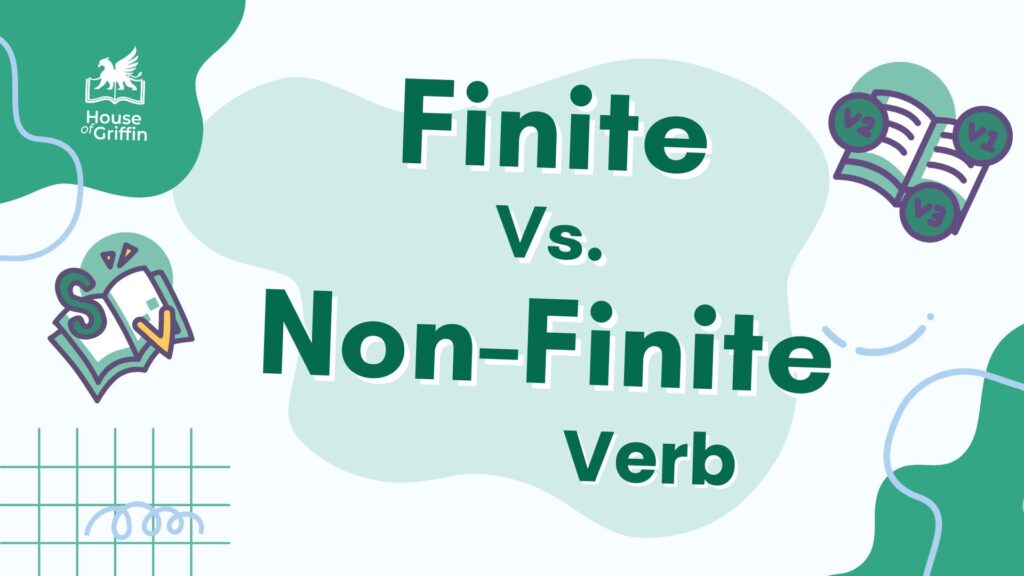
Verbs are the action heroes of every sentence. They show what’s happening and when. But not all verbs are created equal! Some are finite, meaning they do the heavy lifting of showing tense and subject agreement. Others are non-finite—they’re more like assistants, helping out without taking center stage.
Knowing the difference between the two can sharpen your writing, boost your grammar confidence, and help you ace language exams like the SAT Verbal, TOEFL, or IELTS Writing.
What Are Finite Verbs?
A finite verb shows tense (past, present, or future), voice (active or passive), and matches the subject. It’s the core of a complete sentence or independent clause.
Think of it this way: If a sentence were a car, the finite verb would be the engine: it gets things moving.
Examples:
- The professor explains complex theories in every lecture. (Tense: present, Voice: active, S-V agreement: 3rd person singular)
- They had finished their project before the deadline. (Tense: past, Voice: Active)
- I was being questioned by three interviewers at once. (Tense: past, Voice: passive, S-V agreement: 3rd person singular)
- Tomorrow, we will be flying to Tokyo. (Tense: Future, Voice: Active)
What Are Non-Finite Verbs?
A non-finite verb doesn’t show tense and doesn’t change no matter who the subject is. It can’t stand alone as the main verb of a sentence. Instead, it works as part of a verb phrase, or even as a noun, adjective, or adverb.
Think of non-finite verbs like yoga instructors—flexible, calm, and supportive, but not leading the sentence themselves.
Three Main Types of Non-Finite Verbs:
1. Infinitives (to + base form)
to explore, to hesitate, to learn
Example: She promised to return the book before Monday.
2. Gerunds (verb + -ing acting as a noun)
swimming, arguing, coding
Example: Arguing with strangers online is rarely productive.
3. Participles (used as adjectives or parts of verb phrases)
- Present participle (verb + -ing):
Example: The student, struggling to stay awake, blinked rapidly during the lecture. - Past participle (usually ends in -ed, -en, or is irregular):
Example: The forgotten password locked him out of his own laptop. - Perfect participle (having + past participle):
Example: Having read the contract thoroughly, she signed with confidence.
These verbs don’t tell you when something happened—they describe what’s happening in general or provide background info.
Side-by-Side Comparison
Feature | Finite Verb | Non-Finite Verb |
Shows tense? | ✅ Yes | ❌ No |
Changes with subject? | ✅ Yes | ❌ No |
Can be main verb? | ✅ Yes | ❌ No |
Examples | He drives to work every day. | She hopes to drive soon. |
Quick Tips to Remember
- If the verb tells you when something is happening, it’s finite.
- If the verb is acting as a noun, adjective, or adverb, it’s non-finite.
- Every complete sentence needs at least one finite verb to function properly.
- Finite verbs are subject + tense-based; non-finite verbs are timeless and versatile.
Examples from the SAT test
This question focuses on the difference between finite and non-finite verbs. The subject of the sentence is “Paleontologist…analysis,” but there’s no main verb present, so we need to add a finite verb to complete the sentence correctly. If we look at the answer choices, it’s clear that Choice A stands out. “Will help” is a finite verb because it shows tense (future) and is in the active voice. On the other hand, Choices B and C are infinitives, and Choice D is a gerund—none of which can function as the main verb in a complete sentence.
Take Your Grammar Skills to the Next Level with House of Griffin
Understanding the difference between finite and non-finite verbs is crucial for mastering English grammar and excelling in standardized tests like SAT, TOEFL, and IELTS. Finite verbs are the engines of sentences / Every complete sentence requires at least one finite verb to function properly, making this grammar concept fundamental for clear, effective writing.
These are just a few examples. If you’re curious to learn more or need extra help, come join us at House of Griffin. Our expert tutors are here to support students preparing for their exams, helping you score high and get into the college program you’ve been dreaming of.



